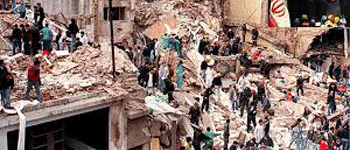 Investigations into the 1994 AMIA bombing in Buenos Aires, Argentina, which killed 85 people and injured hundreds, have been marred with controversy with allegations of incompetence and cover-ups. The most recent setback has been the mysterious “suicide” of Argentine prosecutor Alberto Nisman, who, on 18 January 2015, was found dead at his residence hours before he was scheduled to appear at the Argentine parliament to explain his case.
Investigations into the 1994 AMIA bombing in Buenos Aires, Argentina, which killed 85 people and injured hundreds, have been marred with controversy with allegations of incompetence and cover-ups. The most recent setback has been the mysterious “suicide” of Argentine prosecutor Alberto Nisman, who, on 18 January 2015, was found dead at his residence hours before he was scheduled to appear at the Argentine parliament to explain his case.
In 2006, Alberto Nisman had formally accused the Iranian regime of carrying out the bombing through Hezbollah; a position he maintained till the end. Following the accusation, in November 2006, Interpol issued international arrest warrants against six accused belonging to Iran which include Ali Akbar Velayati, the current advisor to the Supreme Leader Ali Khamenei; Mohsen Rezai, the current secretary of the Expediency Council and former IRGC commander; Ahmad Vahidi, former Defense Minister; Ali Akbar Hashemi Rafsanjani, former president of the clerical regime; Ali Fallahian, former Intelligence Minister; Mohsen Rabbani, former cultural attaché in the regime’s embassy in Argentina; and Ahmad Reza Asghari, the former third secretary in the regime’s embassy in Argentina.
According to columnist Andres Openheimer, who claims to have been in touch with Mr Nisman till a day before his death, the deceased prosecutor had placed current Iran President Hassan Rouhani at the center of his probe into the 1994 bombings. Mr Openheimer said, “In several telephone conversations and e-mail exchanges I had with Nisman over the past three years, the prosecutor told me that Rouhani was among the top Iranian officials who had ‘participated in the decision’ to bomb the Jewish community center in Buenos Aires. Rouhani was a top member of a special committee within Iran’s VEVAK intelligence agency, known as Vijeh, which in 1994 was overseeing secret operations abroad, including the AMIA bombing. Nisman told me that Rouhani was not among the eight Iranian officials who international arrest he had requested to Interpol in 2006, but he was a member of the committee that planned the attack.”
Mr Openheimer is not entirely convinced that Mr Nisman committed suicide as he writes, “There are serious doubts that Nisman committed suicide. In TV interviews and an email he sent me Jan. 17, a day before he was found dead, in which he said he was ‘obviously interested’ in doing an interview after his scheduled Jan. 19 congressional testimony, Nisman seemed very self-confident. He had even left his maid a list of groceries she was supposed to buy at the supermarket the day after he was found dead.”
These accusations cannot be taken lightly. As Mr Openheimer is right in warning the West that while it engages with Iran on the issue of a nuclear deal, it would do well to remember who it is dealing with. The Iranian regime should be made accountable for its alleged role in terrorist activities carried out in Buenos Aires and elsewhere, especially when its serving President faces a serious accusation.







